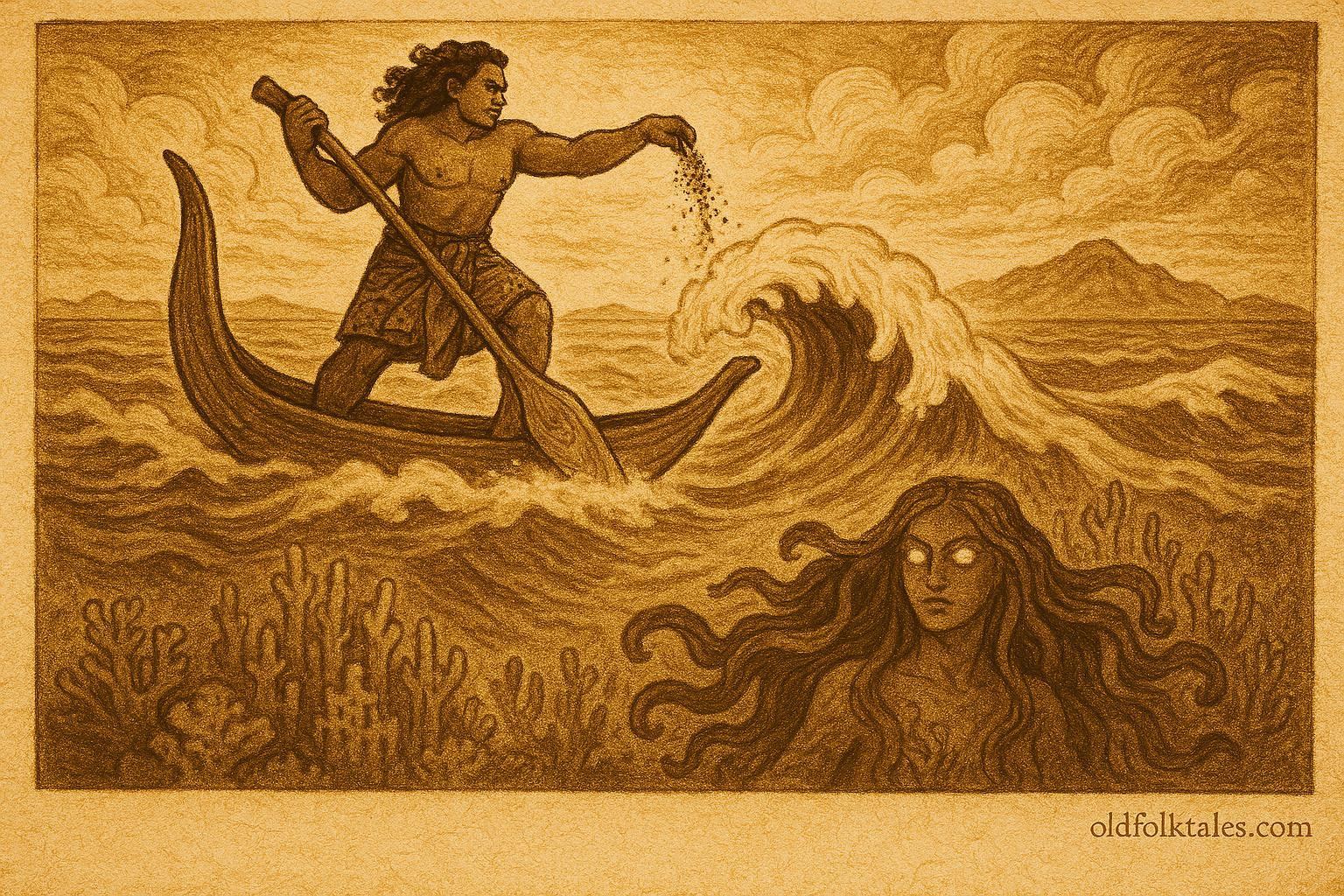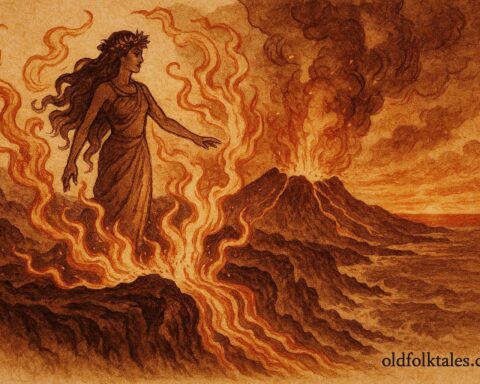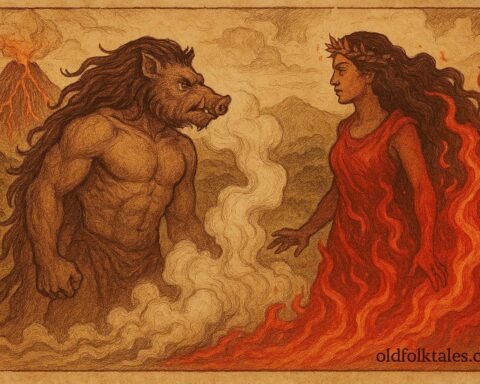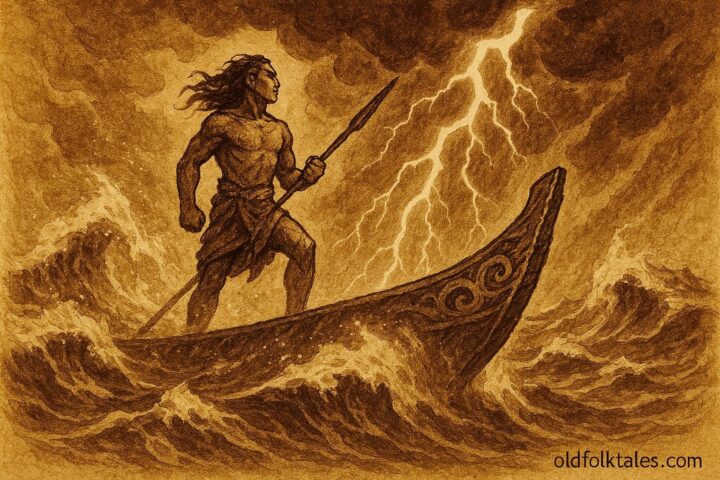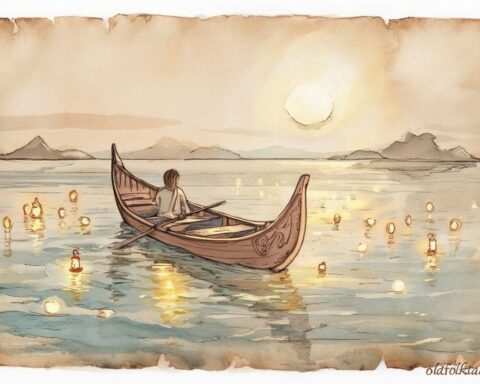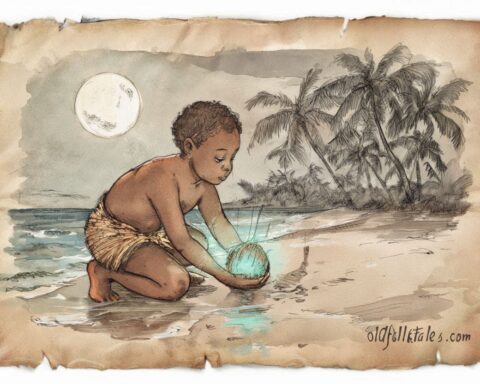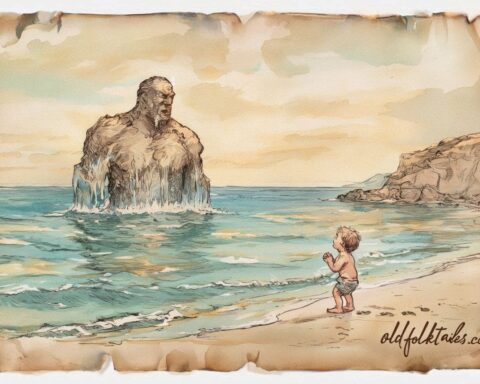In the time before time, when the gods still walked among men and the world was young, the sea lay silent and still. Its surface shone like a mirror, unbroken by wave or wind. Fish drifted lazily in the depths, and the shores of Tonga rested peacefully, kissed only by quiet water.
But peace, as the elders say, is never forever. Even the calmest ocean hides the memory of storms.
Among the gods who watched over the islands was Maui, the daring trickster and bold adventurer, whose deeds were sung from reef to reef. His curiosity was endless, and his mischief knew no bounds. Wherever balance reigned, Maui could not resist the urge to test it.
Another was Hinahengi, goddess of the deep sea, keeper of its secrets and ruler of its unseen tides. Her realm was vast, stretching far beneath the sunlit waves to places where light could never reach. There, in her coral palace, she governed the pulse of the ocean with patient wisdom and quiet pride.
It was said that when Hinahengi spoke, the water itself listened. And when she grew angry, the very depths trembled.
The Still Sea and the Trickster’s Curiosity
One day, as Maui sailed across the quiet waters, he found himself restless. The ocean’s calm, once a marvel, now bored him. His canoe glided as if upon glass, its reflection too perfect, its silence too deep.
He gazed into the stillness and said to himself, “Why should the sea sleep forever? How dull for the waves to rest, the fish to drift, and the shores to stand unchanged. If I could stir the waters, I would give the world movement and life.”
Maui’s brothers, who often accompanied him on his voyages, grew uneasy. “Do not meddle with Hinahengi’s domain,” they warned. “The sea is her heart. She keeps it still for a reason.”
But Maui only laughed. “If the gods wished stillness forever, they would not have made me.”
So he resolved to play a trick on Hinahengi, not out of malice, but from the mischievous pride that was his nature.
Maui’s Trick
Maui fashioned a great shell from the bones of a giant clam and filled it with sacred sand from the island’s shore. He carried it to the deepest part of the ocean, chanting words of ancient power. The sea, in awe of his magic, opened before him.
When he reached the dark domain of Hinahengi, he found her seated upon her coral throne, her hair flowing like strands of seaweed, her eyes glimmering with the calm of the abyss.
“Why have you come here, child of the sun and wind?” she asked. “Few dare to trespass beneath the still waters.”
Maui bowed with mock respect. “I come in peace, Lady of the Deep. But tell me, why does your sea never stir? The world above dances with breeze and flame, yet your waters lie sleeping.”
Hinahengi regarded him with patience. “Because stillness is balance, Maui. The land must be firm, the sea at rest. That is how the world endures.”
Maui smiled slyly. “And yet, stillness grows weary, does it not? The world longs for change. Perhaps even your sea would welcome a breath of life.”
“Do not tempt the currents,” warned Hinahengi, her voice echoing through the deep. “They obey my will. If they were loosed, they would not be easily bound again.”
But Maui, ever defiant, lifted his shell and began to chant a new song, one of motion and rhythm, of the moon’s pull and the ocean’s yearning. As he sang, he poured the sacred sand into the sea, stirring it with his hand.
The water began to move, gently at first, then stronger. Ripples grew into waves, and waves began to roll outward, touching every shore.
Hinahengi rose from her throne, fury flashing in her eyes. “Maui! You have disturbed the heart of the ocean!”
The Wrath of Hinahengi
The sea darkened. Thunder boomed beneath the surface. Hinahengi’s anger broke like a storm, and her voice roared through the water: “You have given life to the tides, but you will not control them! Now the sea shall breathe forever, rise and fall, come and go, and none shall still it again!”
Maui tried to undo his spell, but the sacred sand had already dissolved into the ocean’s veins. The waves surged higher, breaking upon the islands, swallowing beaches and cliffs. His canoe was tossed like a leaf in the wind.
“Mercy, Lady of the Deep!” Maui cried. “I meant only to awaken beauty, not to bring chaos!”
But Hinahengi did not answer. Her power surged through the world’s waters, shaping the eternal rhythm of the tides, the sea’s endless heartbeat.
At last, when Maui’s canoe was cast upon a high reef, the goddess spoke once more, her tone softer but filled with warning:
“Maui, you have bound the ocean to the moon. Twice each day the sea shall rise and fall, forever remembering your folly. Let it remind all beings that even gods must respect what lies beyond their grasp.”
Then she vanished into the deep, and the waters grew calm once more, but never still.
The Eternal Tides
From that day forward, the sea of Tonga breathed as it does now, swelling toward the land, then retreating again, forever in rhythm with the heavens. Fishermen soon learned to honor this new pulse of nature. They built their homes upon higher ground and timed their voyages by the rising and falling waters.
When the tides came in, they said, “Hinahengi breathes in.”
When the tides withdrew, they whispered, “Maui exhales.”
The people never forgot that their world was shaped by both, the daring of Maui and the wisdom of Hinahengi, the trickster and the goddess, folly and balance united.
And so, each wave that kisses the Tongan shore carries an ancient memory: the moment the sea awoke and began to move forever.
Moral of the Story
The legend of The Origin of the Sea Tides teaches that even divine curiosity must bow before balance. Every action carries consequence, and wisdom lies in respecting the boundaries of nature.
Knowledge Check
- Who are the main divine figures in this legend?
Maui, the trickster and adventurer, and Hinahengi, the goddess of the deep sea. - What was the sea like before Maui’s actions?
It was perfectly calm and still, without waves or tides. - Why did Maui decide to stir the sea?
He grew restless and curious, desiring to bring movement and excitement to the silent ocean. - How did Hinahengi react to Maui’s trick?
She grew furious and cursed the sea to forever rise and fall as a reminder of his folly. - What natural phenomenon does this story explain?
The origin of the sea tides,the rhythmic rise and fall of the ocean. - What is the moral lesson of the tale?
To respect nature’s balance and understand that even gods face consequences for pride or recklessness.
Source: Adapted from “Myths and Legends of Polynesia” by Johannes C. Andersen (1928)
Cultural Origin: Tongan (Polynesia, South Pacific)
